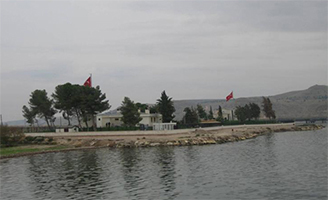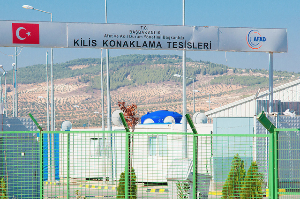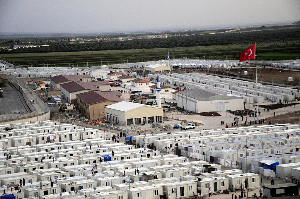Losing a Foothold in a Dream: Turkey's Evacuation of Süleyman Shah
By Gareth Jenkins (vol. 8, no. 4 of the Turkey Analyst)
On the night of February 21-22, 2015, amid fears that it was in danger of being overrun by the ISIS, the Turkish military staged a cross-border rescue operation to evacuate the garrison that had been guarding the tomb of Süleyman Shah in northern Syria. In a move redolent with symbolism for the collapse of Ankara’s dream of transforming the Middle East into a sphere of neo-Ottoman Turkish influence, Turkish troops brought the three coffins in the tomb back to Turkey and detonated explosives to destroy the mausoleum in which they had been housed.

The Syrian Refugees in Turkey Remain at the Mercy of the Turkish Government
By Halil Gürhanlı (vol. 7, no. 23 of the Turkey Analyst)
The Turkish government continues to refuse to grant Syrians who have taken shelter in Turkey refugee status in line with international principles. The Temporary Protection Directive, adopted on October 22, 2014, provides a comparatively more solid legal status for ‘temporarily protected’ Syrians, but it still falls short of granting the refugees their rights in legal terms. The new legislation effectively accords unlimited freedom to the government agencies to decide over the lives and future of two million Syrian refugees. This effectively means that the refugees will have to dance to the Turkish government’s tune if they wish to remain at a relatively safe distance from the horrors of civil war.

Turkey Moves Toward a Grand Bargain with Kurdistan
By Micha’el Tanchum (vol. 7, no. 19 of the Turkey Analyst)
On October 20, Turkey’s foreign minister Mevlut Çavuşoğlu announced that “Peshmerga” fighters from the Iraqi Kurdish Regional Government (KRG) are going to be allowed to transit Turkish territory to reinforce the beleaguered Kurdish forces of the Democratic Union Party (PYD) defending the Syrian Kurdish town of Kobane against the Islamic State of Iraq and al-Sham (ISIS.) The Turkish government had previously turned down requests for it to open a land corridor. Turkey’s policy u-turn means that it now has a unique opportunity to rehabilitate its failed Kurdish policy and arrive at a grand bargain to secure its national interests along its borders with Syria and Iraq. To create a more amenable constellation of Kurdish political allies, the Turkish government will need to offer a meaningful accommodation of Kurdish demands within Turkey.

Turkey’s Water Policies Worry Downstream Neighbors
By John Daly (vol. 7, no. 16 of the Turkey Analyst)
As armed conflict ravages Syria and Iraq, Turkey risks adding to the social and political tensions to its south by cutting the water flow of the Euphrates, which originates in southeastern Turkey and is Western Asia’s longest river, to downstream states. Compounding Iraqi misery, the Islamic State (IS) has been using water as a weapon of war. As unrest continues to roil the Fertile Crescent, whether water is used as a tool of inconsiderate state policy or a weapon of war, the suffering of civilians and farmers has dire political consequences. What is certain is that Turkey’s ambitious GAP program is adding to the misery of the downstream populations.
Turkey Needs Help to Manage the Syrian Refugee Crisis
By Jesper Åkesson (vol. 7, no. 15 of the Turkey Analyst)
The regions of Turkey that border Syria need external support, both from the Turkish government and from the international community, as these parts of the country have come to bear a disproportionally large burden of the refugees fleeing Syria. Public services need to be expanded and ways need to be found to stimulate the local economy. Ultimately, the Syrian civil war will continue to negatively affect Turkey until its resolution – but measures can and should be taken to alleviate the pressure on those hardest hit by this crisis, lest tensions grow further among locals and refugees in Turkey.







